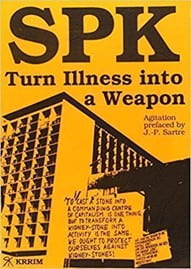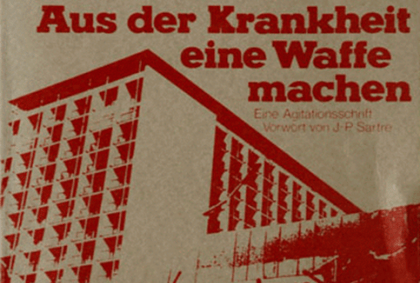By Janina Klement
In a recent blog post, historian of medicine Harry Yi-Jui Wu prompts historians of mental health to rethink experiences of trauma and suffering as communal experiences. He proposes that current global crises such as the COVID-19 pandemic and climate disasters triggered a new transcultural ‘commonality of mental suffering’. This shared experience, Wu argues, resembles communal suffering in the aftermath of World War II; back then, communities in the global North and South mourned, above all other terrors, the Holocaust and the humanitarian catastrophe caused by the atomic war in the Pacific.
In this piece, I take up Wu’s invitation to reconsider collective mental suffering and healing from a global perspective. I explore what impact legacies of radical mental health collectives from the past have on communal healing today, and how a new understanding of mental health can help us cope with contemporary experiences of rampant loneliness, alienation, and depression. This essay weaves together the story of the Socialist Patients’ Collective (SPK), that was active in Germany at the beginning of the 1970s, with contemporary experiences of isolation and depression accelerated by the COVID-19 pandemic and conceptualized in movies such as Joker (2019) and TFW NO GF (2020). I begin with introducing the SPK, a collective of students that questioned the notion of treating mental illnesses and politicized both therapy and illness. I put the SPK’s strategy to “weaponize one’s illness” in dialogue with contemporary mental health struggles. Following Wu, I propose the need for a new history of mental health that considers trauma as collective experience and revalorizes communal healing strategies.
The SPK was founded in February 1970 by assistant psychiatrist Wolfgang Huber at the University of Heidelberg polyclinic. While the Heidelberg University Department of Psychology was the first center for mental health reform in Germany, authoritarian methods such as constraint, coercion, and electroshocks, were still widely used; only a few kilometers from Heidelberg, the notorious Wiesloch State Mental Hospital continued employing medical staff that executed the Nazi’s euthanasia program. Huber refused to send any of his patients to Wiesloch, held consultation hours until late, offered therapy groups, and wrote pamphlets.
The high demand for Huber’s therapy led him to propose his patients to self-organize; they began talking to each other about their problems in his waiting room. This marked the beginning of ‘group agitations’ which would become a key term for SPK’s practice, emphasizing the idea that political action constitutes a form of treatment. The starting point of SPK’s activities was the critique of hierarchical patient-doctor relationships, a demand for patient participation in treatment, and the linking of psychotherapy and politics. After organizing the first German ‘patients general assembly’ which radically questioned the self-image of established medicine, Huber was fired by the clinic management. The SPK started to operate independently from university and other institutional structures. Or, as French psychiatrist Félix Guattari put it, a “little intra-hospital experiment [became] a mass struggle” (7).
SPK’s manifesto proclaims an essential relationship between illness and capitalism: the experience of illness is linked to the experience of alienation in a Marxist sense. As the independent researcher Sasha Durakov Warren demonstrates in his essay “Distress is a Weapon”, the SPK did not claim that capitalism is to blame for illness, but that illness cannot be thought of outside the capitalist context. The only cure for patients is to cure the context in which they fell ill: for the SPK, society itself becomes the patient.
For a brief period, some SPK members shared a flat where they organized political actions, study groups, and group agitations. During its short existence, more than 500 patients passed through the SPK. It drew people from different age groups and social and professional backgrounds, mostly students but also pupils, social workers, housewives, teachers, workers, and runaways. Some were politicized in the 1960s, others went through psychological and social crises or made bad experiences with institutional psychiatry.
The SPK was under constant threat and observation by the state police, the university, and the media. The collective was suspected to have formed an inner circle under Huber’s supervision, to possess weapons, and to prepare an armed overthrow. In 1971, some SPK members, including Huber, were charged under the suspicion that they were involved in a fire exchange with the Heidelberg police. The witness statements in court remained contradictory and none of the accusations could be proven, but Huber and his wife were still sentenced to four and a half years in jail.
Subsequently, the SPK fell apart and some members joined the German far left militant organization Red Army Faction (RAF). In its terminal phase, due to the rising pressure from outside, the SPK aimed to acquire self-defense strategies and knowledge. Besides the Hegel reading group there emerged study groups in photography, radio, and explosive charge technique, none of which recorded any successes. The SPK has often been reduced to ‘breeding’ terrorists, and its slogan ‘Turn Illness into a Weapon’ was interpreted as a call for violence. This view, however, conceals the SPK’s founding principles: self-empowerment and solidarity between patients, the critique of systemic misconducts within the medical system, and the relentless commodification of illness in capitalism.
****
Through different genres, perspectives, and narrative strategies, two recent films became mouthpieces for the state of despair and isolation many people were to experience during the first COVID-19 lockdown. The movie Joker (2019) by Todd Phillips follows its mentally ill protagonist Arthur Fleck, a failed comedian, through a trajectory of rejection, loneliness, and violence. Alex Lee Moyer’s documentary film TFW NO GF (2020) (acronym for ‘that feeling when you have no girlfriend’), released in April 2020 at the peak of the pandemic, documents the hopeless states of young men in the United States, who, due to an entanglement of economic factors, problems in their families, and mental health issues have fallen through every crack in the welfare and healthcare system.
The phrase ‘tfw no gf’ was originally used online to describe a lack of romantic companionship but has since evolved to symbolize states of existence defined by isolation, rejection, and alienation. A lack of community in real life is substituted by online forums where most communication is mediated through memes (images embellished with text that make fun of current political, popular, or cultural artefacts). Shortly after the release of Joker, memes that imagined potential Joker audiences as misfits incapable of socially acceptable behavior went viral on social media platforms.
Moyer’s documentary suggests that the memes circulating in online communities of strangers are striking critiques of the relationship between society, madness, and capitalism. This discourse recalls critical positions the SPK voiced in the 1970s. The SPK claimed that the only form of therapy fit to heal diagnosed patients would be the abolition of the pathogenic, private-economic, i.e., capitalist, society. All other forms of therapy would only aim at restoring the ability to work, and, therefore, repeat the same ill-making logic. Similarly, the disconnected protagonists of TFW NO GF blame societal reasons for their hopeless situation; as one of the young men explains, the cards they were dealt were just not good enough to compete, neither on the job market nor in the social sphere.
In this context, the phrasal template ‘Tickets to Joker please’ that inspired twitter users to create countless memes, illuminates how online communities critically engage with the relationship between capitalism and madness. Its pictorial visualizations circulated on social media platforms after the 2019 release of the new Joker movie. The memes show how users imagined the clash between Hollywood audiences and Joker admirers. They make fun of potential Joker audiences, but also point out how the film industry, in their race to increase profit, failed to consider that a depiction of Joker, the hero of ‘madmen’ and social misfits, would attract Joker’s entourage to flock to the cinemas.




The most controversial image circulating at the time showed a young man holding two machine guns with the comment ‘one ticket for joker please’. Many people interpreted the post as a threat and feared a potential shooting at a cinema. But when asked about his motives, he answered that he never had the desire to shoot anyone, and that the post was meant as purely satirical.

Despite the distance in time and contexts, relating the picture of the armed online troll to SPK’s slogan ‘Turn Illness into a Weapon’ (1970-1) highlights striking aspects of the processes that contribute to “make illness” in capitalist societies. This slogan was, in fact, the result of the SPK’s conviction that illness was “the only form in which ‘life’ in capitalism is possible.” It was an appeal to reclaim self-agency and the prerogative of interpretation over one’s diagnosis. This slogan proposed an alternative diagnosis: not the individual was ill, but society, and in particular the medical system. The only way to resist ill-making conditions, the SPK claimed, was to weaponize one’s illness against those institutions and agents in society that profited from diagnosing and treating mental illness.
The pandemic saw widespread protests in many parts of the world. But at the same time, the pandemic has also produced a very tame type of mental patient that will prove to be more enduring than any protest: a person who does their daily business from bed, spends most of their time online, and experiences potentially clinically relevant conditions such as social anxiety, depression, mistrust in others, or hypochondria.
Both countercultural therapeutic collectives and online communities of disconnected young people in times of COVID-19 have exposed the need to deal with trauma and madness on a communal scale. While online communities today do not explicitly share the SPK’s revolutionary agenda, their struggles turned out to be similar: if everyone is ill, illness loses all meaning. This opens space for the question of how we want to live, what communities we want to build, and how traumatizing experiences like natural, health or economic crises can be dealt with communally. The desires that brought the SPK together are as relevant today: that is, emancipation from antiquated traditions and abusive medical practices, cooperation and solidarity between patients, and the inclusion of both patients and medical experts into the process of rethinking therapy. The COVID-19 pandemic has exposed the global fragility of medical systems as well as inequalities in the distribution and availability of healthcare. On another level, months of isolation, a lack of companionship, and the experience of being ill in isolation has caused the desire of stronger connections, more cooperation, and communal self-help.
The post-pandemic era faces historians of mental health with two challenges: first, to renarrate histories of trauma as communal experiences; second, to trace what remedies circulated among different communities after environmental or health catastrophes. This new history of mental health opens transcultural perspectives on meanings and practices of collective stabilization and healing. Instead of atomizing experiences of indeterminate grief in solitude, mental suffering requires to be reclaimed as an event relating to continuous threats that expose structural reasons for discrimination. While no fixed meanings are attached to mental health, reconsiderations of communal therapeutic experiments – including in the Global South – are required. These will remind us that a re-acknowledgement of mental suffering as a communal experience produces relevant knowledge and tools to tackle mental health challenges on a global level.
Janina Klement is a Wellcome Trust funded PhD researcher in Health Humanities at University College London and an affiliated student at the Birkbeck Centre for Interdisciplinary Research on Mental Health. Her project investigates the twentieth century history of psychiatry critique and countercultural therapeutic experiments in Europe and the United States.
Featured Image: SPK manifesto ‘Aus der Krankheit eine Waffe machen’ (‘Turn Illness into a Weapon‘). Book cover: Trikont Verlag, 1972.



